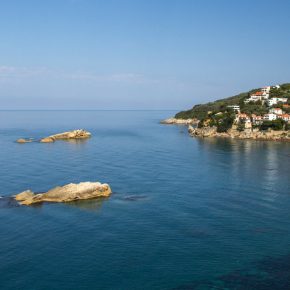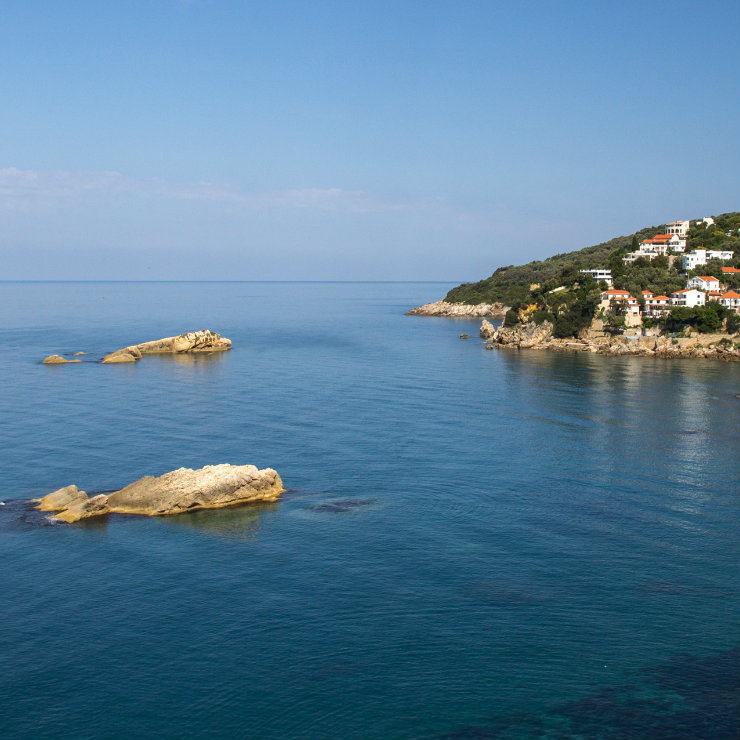Tydzień w gospodarce
Category: Trendy gospodarcze
Analyst, journalist specializing in the Western Balkans and Middle East domestic and foreign affairs

Ulcinj, Montenegro (Alex Alishevskikh, CC BY-SA)
The seismic exploration of oil and gas in the underwater began on November 2018. Surveys are planned for approximately 1,200 square kilometers of sea bottom, for which the concession was awarded to the Italian-Russian consortium Eni-Novatek. With the help of sound-air cannons, as well as special geomicrophones, which are several kilometers long and connected to ships, it will be accurately determined whether there is a commercial exploitation of the oil and gas deposits in the Montenegrin waters. An independent assessor of the „Competent Persons Report, CPR” claims that Montenegro has 51 billion cubic meters (bcm) of gas and 144 million cubic meters (mcm) of current resources, which is about 438 million barrels of oil. The data referred to the 330 kilometers square in Ulcinj.
The state will collect all profits from oil exploitation through a surface charge, a refund for oil and gas produced, and a tax of 54 per cent. In the final analysis, the estimate is that, depending on the scope of exploitation, the state would receive between 62 and 68 per cent of the total revenues from these activities, the Montenegrin Hydrocarbon Administration said. A ship moving at a slow speed between 4 and 6 knots will use a device emitting sound pulses or aerial cannons. Sound will be reflected from the seabed, and marine computers will process seismic data. This signal will be analyzed by a super computer and create a picture of what’s underneath the surface. This will allow the companies to explore the potential resource of the area for which they obtained the permit.
Another permit is given to the Greek company Energetska Oil & Gas, which will begin its research soon. If it will be successful, first drilling would commence in 2020. The minimum number of wells of the Italian-Russian and Greek companies is defined by the contracts they signed with the Montenegrin government. Eni and Novatek will drill two: one will be 6,500 meters deep and the other 2,000. The first well will be outside of Montenegro’s waters, in the area between Bar and Ulcinj and 23 km away from the coast.
The worries of ecologists, tourist workers, as well as residents living in the coastal zone are getting bigger. They are concerned about the fate of the eco-system of the Montenegrin part of the Adriatic, as well as whether the holes will „wake up the soil”, and reduce the influx of tourists. The exploration of oil and gas in Montenegrin seabed is opposed by a non-governmental organization Green home. They think that citizens do not know enough about the consequences of research and production of hydrocarbons. „Our slogan is wild beauty. Where is the wild beauty of the oil platforms? We think that the citizens are not adequately informed of what exploration of oil and gas in our small sea means and what consequences it brings not only to biodiversity, but also to the health and quality of life of citizens. As well as various economic sectors, such as fishing and tourism”, warns Nataša Kovačević from the Green Home. Ms. Kovačević claims that any oil search is in contradiction with the first article of the Constitution that defines Montenegro as an ecological state and that seismic research will cause enormous damage. The oil companies claim otherwise.
Every activity carries some risk. In this case, the risk of geophysical research is minimal, but this has long been discussed with the Environmental Protection Agency. Finally, the companies have identified all the necessary risk mitigation measures, in line with the latest and most advanced regulations and all international standards of nature protection. Geophysical engineers say that the risk can only exist from the oil spill when drilling. These are extremely rare cases.
If the existence of black gold is determined, the income from 62 to 68 per cent will remain in Montenegro. This money will not be directly linked to the budget, but will also be preserved for future generations. The draft law on the fund is under way, a copy of the Norwegian model. The government and the parliament have decided that only 15 per cent of potential income goes to the budget, and 85 per cent will be something like a family silver that belongs to the generations to come. These funds will be allocated in an investment development fund, which will generate additional income.
The research concession does not include extraction, but focuses only on research and increasing knowledge of hydrocarbon potential. The state, as the owner of the data, has a multiple benefit from such a process. Through the contract it gives the right to offer data to a greater number of clients. The profit achieved by this activity, after covering the costs, will be shared between the state and the company. When the contract period expires, the data and the right to their commercialization will exclusively belong to the Montenegrin state. This means that the state will generate significant revenues from the sale of these data. The main benefit is that the government will have more knowledge about the situation in the Montenegrin underwater, and will get a more accurate picture of potential commercial oil and gas fields, which will lead to creation of the new oil companies in Montenegro.
Vedran Obućina is an analyst and a journalist specializing in the Croatian and Middle East domestic and foreign affairs. He is the Secretary of the Society for Mediterranean Studies at the University of Rijeka and a Foreign Affairs Analyst at The Atlantic Post.


